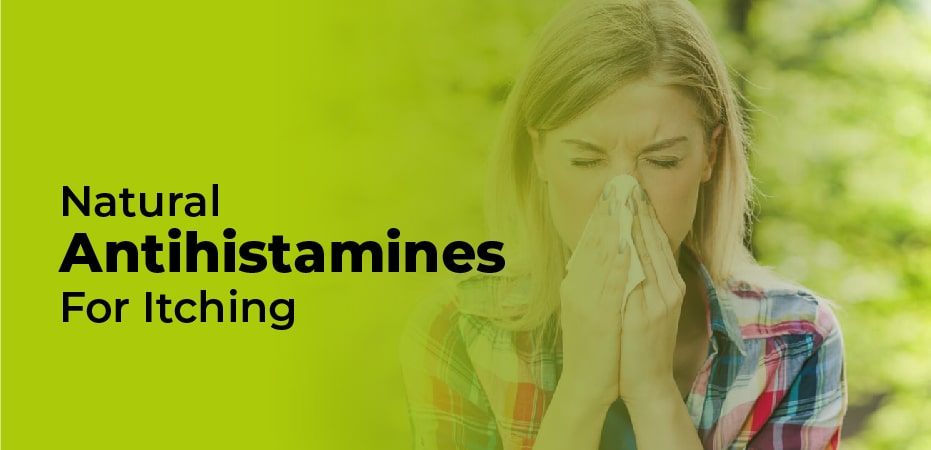Natural Antihistamines – To Save You From Allergies
It is not uncommon for seasonal allergies to leave you with a lot of headaches. This can become difficult to bear if the patient suffers from sneezing, itchy eyes, nasal congestion, and sinus pressure.
You have likely tried many over-the-counter (OTC) remedies to do your best to alleviate the seasonal symptoms and perhaps you would like to try something else. Research has indicated that completely natural solutions may alleviate seasonal symptoms.
There are several drugs available – such as prescribed and over-the-counter – that can help treat this condition that is commonly called hay fever, allergic rhinitis, or seasonal allergies. However, some of the medications on this list come with their unique list of side effects.
Having a thorough knowledge of how antihistamines work can help understand how natural antihistamines can help you combat the effects of allergies during spring and summer.
Table of Contents
What Are Natural Antihistamines?
By preventing the histamine from hitting our body too significantly, antihistamines improve our overall health. While several prescription antihistamines and over-the-counter antihistamines are readily available at any drug store today, many people experience problematic side effects from these drugs and are looking for an alternative through a natural antihistamine.
According to Ralph Esposito, a physician and licensed acupuncturist who practices naturopathy, there are a variety of reasons people want to try using alternative supplements rather than pharmaceutical antihistamines. The good news is that most natural antihistamines cause very few side effects, and they seldom make you drowsy.
Natural Antihistamines For Hives
VITAMIN C For Good Health
A vitamin C supplement is one of the greatest gifts of nature. Vitamin A functions as a natural antihistamine, as well as numerous other functions in the body. Due to its role in fighting free radicals and in collagen synthesis, it is vital to human health. Consume vitamin C-rich foods as soon as possible, as their strength is lost after being exposed to air, or after being processed, boiled, or stored for long periods.
Guavas, blackcurrants, red bell peppers, and kale are all excellent sources of vitamin C. Other good sources of this vitamin include parsley, strawberries, papayas, cauliflower, green peppers, red cabbage, broccoli, and red cabbage.
Others are spinach, elderberries, yellow summer squash, cantaloupe, calf liver, turnips, citrus fruits, peaches, asparagus, cayenne pepper, green onions, new lima beans, raspberries, and sweet potatoes.
More are loganberries, cranberry juice, pineapple, vegetable juice, rutabaga, tomato juice, and kohlrabi.
FLAVONOIDS For Itching
Quercetin is a flavonoid pigment found in plants that determines the color of many fruits, vegetables, and flowers. The nutrient quercetin works to prevent both the production and release of histamine and other allergenic compounds by mast cells. Citrus fruits, onionsparsley, tea, lettuce, legumes, tomatoes, broccoli, garlic, apples, berries, and wine (no need to be mad at that!).
Omega 3
Observations suggest that omega-3 fatty acids can reduce allergic reactions by their anti-inflammatory properties. Cold-water fish (like salmon) and walnuts are high in Omega-3 fatty acids. Grass-fed meat and flaxseed oil can also be good sources of Omega-3s.

Natural Antihistamines For Itching
There are many allergy medications at your local pharmacy that work as antihistamines. In addition, there are also Natural Antihistamines For Itching extracted from certain foods and plants that can block histamine similarly.
Insect Stinging Nettle
Natural remedy stabbing nettle is at the same time a natural antihistamine. A 2000 study found that 58 percent of participants found that nettles reduced symptoms and 69 people rated them better than a placebo.
Health food stores and online stores sell stinging nettle. In this study, participants consumed 300 milligrams (mg) of caffeine per day.
The Antioxidant Quercetin
Among other things, onions, apples, and other fruits and vegetables naturally contain quercetin, an antioxidant. The antihistamine effect of quercetin has been demonstrated by ResearchTrusted Source.
In a 2007 study trusted Source independently found that it even reduced the allergic side effects of rats by reducing the inflammatory response in their airways. As an alternative, you can consume more foods rich in quercetin (the better option).
Contains Bromelain
In addition to pineapples, bromelain can also be found in supplements. As a result of its effects on allergic inflammation and respiratory distress, it is said to be effective. In a 2000 study, 400 to 500 mg were recommended three times daily. The consumption of pineapple is recommended for acquiring bromelain.
Butterbur Antihistamin
Butterbur is a marsh plant found all over Europe, Asia, and North America. It may reduce migraine attacks, and it could also help with nasal allergies, according to TrustedSource research. Another study suggests that taking butterbur supplements may help people suffering from allergies improve their symptoms.
Conclusion:
Having allergies can be frustrating because relief can seem so far away. The use of natural antihistamines combined with proper self-care and allergen avoidance (when possible) can provide allergy relief. Nutrition and exercise can help your immune system perform at its best.
You should also keep in mind that while these antihistamines are safe and natural in food, supplements are not regulated in the US. Be sure you get them from quality sources and discuss supplement use with your doctor.
